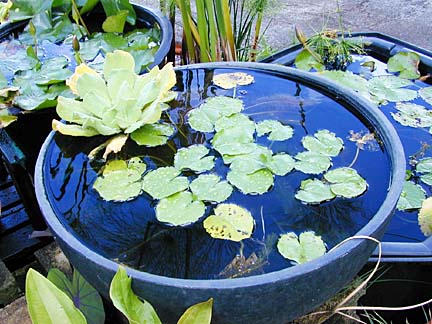


Blame those nasty female mosquitoes when it comes to spreading dengue fever. Eliminate mosquitoes before
they come for youBy Tim Ryan
tryan@starbulletin.comThat's because it's only that gender of the species that bites. The males' mouth parts are not suitable for piercing skin, so plant nectar -- not blood! -- is their principal food source.
Mosquitoes in Hawaii were once a minor annoyance, but now threaten to spread dengue fever, making it more important than ever to keep their numbers in check.
Elimination of the critters is pretty much dependent on the stage of the mosquito: egg, larva, pupa, or adult. There are different methods for different stages because some are effective only when the bug is in the larval stage, while others kill only adults.
Chemical control of mosquitoes around the home can be accomplished with the use of repellents or space sprays. All insect repellents, including DEET and pyrethroids, should have the name of the active ingredient on the label.
Oil of citronella is another space repellent. Citronella is the active ingredient in many of the candles, torches, or coils burned to produce a smoke that repels mosquitoes. These are useful outdoors, but only under windless conditions. They are somewhat less effective than repellents applied to the body or clothing.

Space sprays can be used to kill mosquitoes present at the time of treatment. The advantage is immediate knockdown, quick application and relatively small amounts required for treatment. Space sprays are most effective indoors; outdoors, the insecticide particles disperse rapidly and may not kill many mosquitoes. A disadvantage of space spraying is that it will not manage insects for long periods.Mosquitoes can be killed inside the home by using a household aerosol space spray containing synergized pyrethrum or synthetic pyrethroids. Only insecticides labeled for flying-insect management -- it may not specifically mention mosquitoes -- should be sprayed into the air. Best results are obtained by keeping doors and windows closed during spraying and for 5 to 10 minutes after spraying.
Homeowners also can use hand-held foggers for temporary relief from flying mosquitoes.
The sprays are plentiful at most garden and hardware stores, but some of the most effective items -- mosquito "dunkers" and granules that are immersed in standing water -- are much harder to find in Hawaii since the recent dengue outbreaks.
In fact, sales of water lilies and plants which hold water -- and attract mosquitoes -- like bromeliads, ti leaf, heliconia, ginger, even cactus -- have slowed since the outbreak, according to Koolau Farmers' general manager, Dwight Nikaido.
A wide range of insecticides that kill mosquitoes are available, including Diazinon and Malathion, which must be diluted in water and sprayed over an area, he said.
But the most popular mosquito-cide, which attacks the bug in its larval stage, is "the one we're out of," Nikaido said.
Mosquito Dunks and Mosquito Bits are simply dropped in standing water. The product is the best solution for standing water, like ponds and slow-moving streams, because the bacterial solution -- harmless to people, fish and other household pets -- can kill larvae for up to 30 days, while sprays, used strictly on adult mosquitoes, may last only a couple of days, Nikaido said.
"We don't usually sell too much of it," Nikaido said. "We only had about 35 packages and we sold out in four days. Normally that would have lasted us through February."
The granules sell for about $11; the dunks, $8.
Nikaido has ordered a special air delivery of 72 packages from the mainland, which means he'll have to raise prices about 25 percent.
There's also been some increase in the sale of small fish such as guppies and mollies for outdoor ponds. The tiny fish eat mosquito larva, said Randy Hughes, assistant manager at Pet's Discount's Salt Lake store.
"People are buying more of these fish to stock outdoor ponds," he said. "They're very effective."
One of the newest and reportedly most effective products being used to eliminate breeding female mosquitoes is the pricey Mosquito Magnet, distributed in Hawaii by Gaspro.
The company has sold about 20 of the two models, at $800 and $1,300, during the past couple of weeks. Last year the company sold just 79. Many sales were to Maui residents where dengue was first noticed, although Gaspro now is getting inquiries on all islands.
Honolulu city officials recently purchased some models to test their effectiveness, said Jan Oshiro, Gaspro marketing manager.
The machine looks like a small barbecue and works by attracting biting insects with a warm, moist carbon dioxide plume. As they approach the source, they are vacuumed into a net where they dehydrate and die.
Tests have shown that 90 percent of the mosquitoes biting you live within 100 yards since they cannot detect the carbon dioxide you breathe out beyond that distance. According to a company spokesperson, the Mosquito Magnet usually captures more than 1,500 female mosquitoes daily.
A female will produce more than 300 offspring during its four-week life span, so for every 1,000 females trapped, 300,000 potential offspring will be eliminated. As succeeding generations are eliminated, the population in that area will collapse after six to eight weeks of continuous use, Oshiro said.
The lower-priced Mosquito Magnet covers 3/4 of an acre; the Mosquito Magnet Pro covers one acre and is recommended for use in high temperature, high humidity, saltwater environments.
Each device uses a standard 20-pound propane tank to produce carbon dioxide and generates its own electricity, making it self-powered. The tank must be refilled every three weeks, Oshiro said.
Ed Johnston, owner of the Alia Point Ava Nursery at Pepeekeo, on the Big island, said the mosquitoes were "unbearable" where he grows stock plants in a tropical jungle. He estimates the device has decreased the number of mosquitoes "five to 10 times."
Click for online
calendars and events.